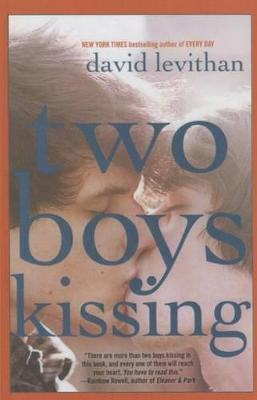Reviewed by nannah on
On one hand, I LOVE that this is a beautiful, poetic tribute to gay boys, but on the other hand . . . I'm not sure if I actually enjoyed the book?
Content warnings:
suicide
homophobia
homophobic slurs
Two Boys Kissing is a plotless, read-for-the-experience type book from the collective PoV of gay AIDs victims. They visit Cooper, a depressed boy who runs away after his parents find out he's gay, two boys who meet at a gay prom (one of whom is a trans boy), two boys who are trying to break the world record for kissing, and two more boys already boyfriends. They sort of also visit Tariq, a black gay boy, whose entire purpose in the book is to support the two boys kissing--even so much so that he has the solid word line: solidarity (which seems slightly backward), and his pov doesn't get a separate chapter as often (or barely) as the others or as much focus or care.
I could also tell the book was written by a white author when I read this: "People like to say being gay isn't like skin color, isn't anything physical. They tell us we always have the option of hiding. But if that's true, why do they always find us?"
Why do people always feel the need to compare sexuality to skin color when they're two different experiences and are not really comparable? People keep trying to find ways to make being gay on the "same level" of oppression as being black, asian, latinx, etc.. . . and it's such a tiny paragraph here, but it still makes me roll my eyes.
Characters often break into lectures, too, that seem awkward and preachy. I expect it from the narrators, but it's strange coming from the characters' mouths in casual conversation. It feels like David Levithan just has so many points he wants to cover that he loses track of them and whether or not they're placed in the right spots. They're just kind of thrown in to make sure they actually made it in the book somehow.
I guess I'm not sure if I'm the right audience for this. Maybe it's for gay boys or for people who should be educated/more exposed to the LGBT+ community (which is like, pretty much everyone). However, as a queer woman (sorry for the q slur), this book was kind of isolating, too, only mentioning girls as a side note or as friends to the characters, and only once mentioning LGBT+ women. Only once. This book was mostly written from a white experience, too, which can be isolating as well.
Anyway, it was a nice read, but I probably won't read it again.
Reading updates
- Started reading
- 2 August, 2015: Finished reading
- 2 August, 2015: Reviewed
